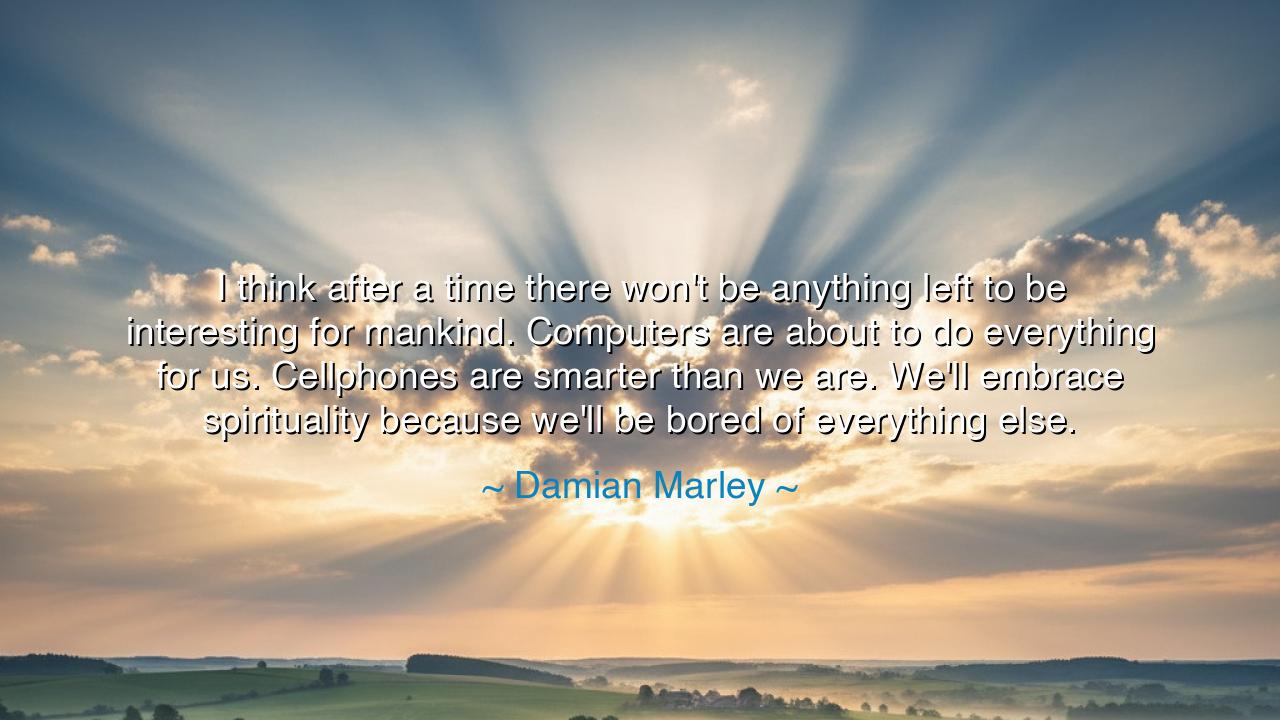
I think after a time there won't be anything left to be
I think after a time there won't be anything left to be interesting for mankind. Computers are about to do everything for us. Cellphones are smarter than we are. We'll embrace spirituality because we'll be bored of everything else.






"I think after a time there won't be anything left to be interesting for mankind. Computers are about to do everything for us. Cellphones are smarter than we are. We'll embrace spirituality because we'll be bored of everything else." These words, spoken by Damian Marley, echo a deep concern about the direction in which our society is headed. As we stand on the precipice of technological advancement, there is a sense that humanity, in its constant pursuit of convenience and progress, is losing touch with the essential aspects of life. In his reflection, Marley highlights a paradox: as technology takes over more and more of our daily lives, from managing our finances to deciding what we eat, we find ourselves drawn toward something more meaningful, something beyond the confines of modern invention—spirituality.
The ancient Greeks recognized the danger of overindulgence in the material world. Socrates famously said, "An unexamined life is not worth living," acknowledging that true fulfillment comes from deep reflection and self-awareness, not from the pleasures or comforts that external systems provide. Plato too, in his allegory of the cave, spoke of how the soul could become trapped in the shadows of illusion, tethered to false comforts, unable to grasp the truth. Similarly, Damian Marley’s words suggest that our increasing reliance on technology could lead us into an empty, distracted existence—where convenience and efficiency replace the rich, meaningful experiences of life.
Consider the example of the Roman Empire, a civilization renowned for its innovations in engineering and technology, from roads and aqueducts to monumental structures. Yet, despite these material achievements, the empire faltered as it became disconnected from its spiritual and philosophical roots. The citizens, engrossed in their comforts and distractions, lost sight of the deeper purpose of life—virtue, wisdom, and reflection. Much like what Marley warns of today, the empire’s advancements eventually contributed to a sense of boredom and decay, as the true essence of human existence was overshadowed by an overreliance on external systems.
Marley's caution resonates with the story of Kierkegaard, the great existentialist philosopher, who warned against living a life of mediocrity, driven only by external distractions. Kierkegaard spoke of the "sickness unto death," a spiritual malaise that arises when a person is so consumed by the external world—by achievements, appearances, and comforts—that they fail to confront the deeper questions of existence. Technology, in Kierkegaard’s view, might offer fleeting pleasures, but it could never provide the profound meaning and purpose that comes from genuine introspection and connection with the soul. Just as Kierkegaard foresaw the emptiness of a life without true spiritual connection, Marley predicts that as our world becomes more automated, we will inevitably turn toward something deeper to fill the void.
Yet, in Marley’s reflection, there lies a lesson—not one of resignation, but of reclamation. It is true that technology will continue to evolve, making our lives more efficient and our tasks simpler. But we must ask: in this ever-advancing world, where does humanity stand? Will we allow ourselves to become mere consumers of progress, endlessly entertained but never fulfilled? Or will we, as Marley suggests, seek something higher—something beyond the tangible and the material? Spirituality, the pursuit of meaning beyond the physical, may be the antidote to the boredom and disconnection that technology can bring.
The lesson for us all is one of balance. Technology is not inherently bad; it has the power to connect us, to empower us, and to enhance our lives. But we must resist the temptation to allow it to replace the deeper human experiences—love, connection, and self-awareness—that nourish the soul. Just as the ancient philosophers sought wisdom in the quietude of reflection, we too must find moments to pause, to reconnect with our inner selves, and to question the world around us. As we embrace the conveniences of the modern world, we must also cultivate spiritual practices, whether through contemplation, nature, or mindfulness, that remind us of the transcendent purpose of life.
In our own lives, let us strive to live in a way that honors both our human nature and the possibilities that technology provides. We should not shy away from progress, but we must also safeguard our inner lives from becoming hollow. Let us seek balance, and in doing so, create lives that are rich with purpose, meaning, and connection—not just to the world around us, but to the deeper truths that guide us. In this way, we can build a future where technology serves to uplift the human spirit, rather than diminish it.






AAdministratorAdministrator
Welcome, honored guests. Please leave a comment, we will respond soon